TURNER — Nezinscot Farm owner Gloria Varney sat in her store kitchen packing green beans in glass canning jars one late August day. “These are for dilly beans,” she said.
It is some of the only downtime she gets during the day in her seven-day-a-week job farming.
“We’ll never be short on food,” she said. “You know, that is a given. But I think all farms will always be — unless you have a perfect year — it will always be on the edge most of the time.”
This time of year her schedule looks like this: baking in the morning, milking goats and sheep in the afternoon, and processing produce for canning while it is still fresh in between everything else, she said. Help can be hard to come by, but there are usually about eight people working at one time during the day, most of them full time.
Despite the hard work, Varney knows all too well there is little stability in farming, from the field to the finances, she said. The current drought, for instance, could force her to buy cow feed that she usually grows. Perhaps the only reliable aspect of farming is the fact that there will always be expenses.
That reality often forces farmers to have a diverse array of revenue streams to stay afloat.
One of the ways some farms accomplish that is through Community Supported Agriculture, in which members of the community pay for a share of a farm’s produce, meat and other products.
Through that steady income stream, CSAs give farmers a sense of predictability that is usually lacking in the industry. For some, it’s the difference between staying in business and losing the farm.
The programs also allow farmers to develop a relationship with customers, and impart upon them the importance of supporting the people who produce food locally.
“Farmers can set them up all different kinds of ways, depending on what their customers are looking for and what works best for their farm business,” said Alex Fouliard, manager of the Maine Farmland Trust’s farm business planning program.
Because CSAs provide steady funding from the beginning of the season, farmers can better plan their season, Varney said. Sales through farmstands and farmers markets can be hard to predict and Community Supported Agriculture provides some financial certainties.
Maine Farm Land Trust helps farmers set goals and come up with sales models to help them achieve those goals, and CSAs have emerged as one of the ways to reach revenue benchmarks, she said.
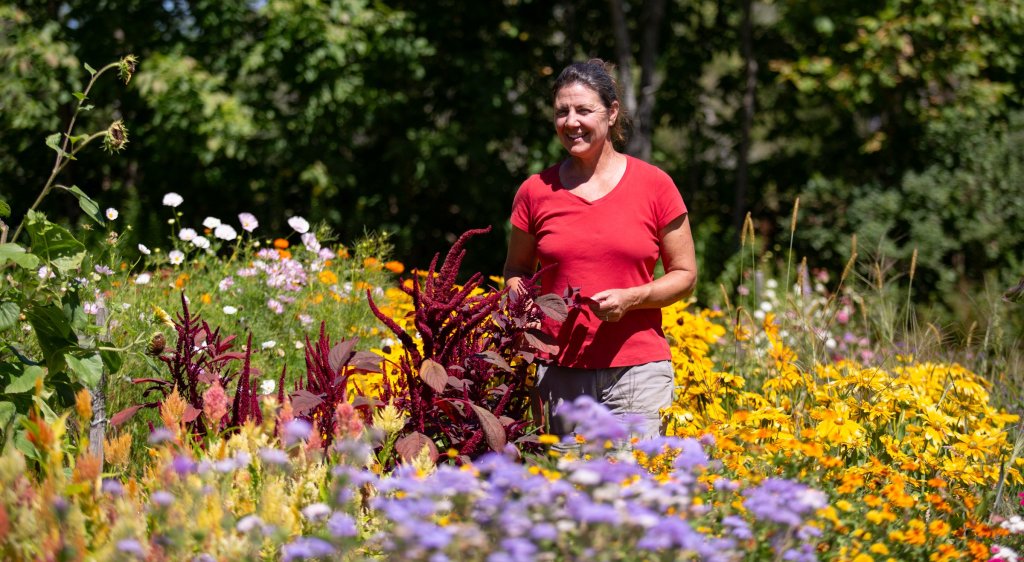
Keena Tracy stands among her favorite flowers Aug. 21 at Little Ridge Farm in Lisbon. Flowers are included in the Community Supported Agriculture program. Tracy said CSAs are a good way to expose Mainers to the many things grown on Maine farms. (Libby Kamrowski Kenny/Staff Photographer)
Organic farmer Keena Tracy, who owns Little Ridge Farm in Lisbon, says there is no shortage of stressors when it comes to operating a farm, but she finds moments of solace in the fields and when her hands are in the dirt doing what she loves.
Tracy has found more financial stability in the CSA model. Without it, her farm could not survive, she said.
For roughly 18 years Tracy has been offering CSA services to the community, she said. Though participation in hers waned in 2023 and 2024, it ballooned again this year and now she has people on waiting lists for the service.
When people sign up for her program early, like in March or April, she can better prepare and plan her crop, she said. She also does not have to scramble to find other ways to sell her food when it is harvested.
“The CSA model is great for us financially because the money, it comes in early, it allows us to buy seeds … we start doing stuff in the high tunnels and on the farm months before customers start coming,” she said. “So that way, I’m able to pay my employees. And all of those things help us to keep our price more moderate because we’re not having to get loans and pay interest in order to do all of those things.”
Tracy’s customers and the community are an integral part of what helps her run the farm as efficiently and sustainably as possible — because it is easy to lose money and become unsustainable, she said.
The face-to-face interactions between farmers and customers are also a good way to build a relationship with the community, Fouliard, of Maine Farmland Trust, said. It also helps them explain to customers the uncertainties and hurdles farmers often face.
“Farmers have to incur all of the costs to produce that head of lettuce or that beef cow, or whatever it is, before they get to realize any income from that product,” she said. “And so this is a way of making that transparent to customers and also kind of helping to better match those expenses and income, the timing of all of that.”
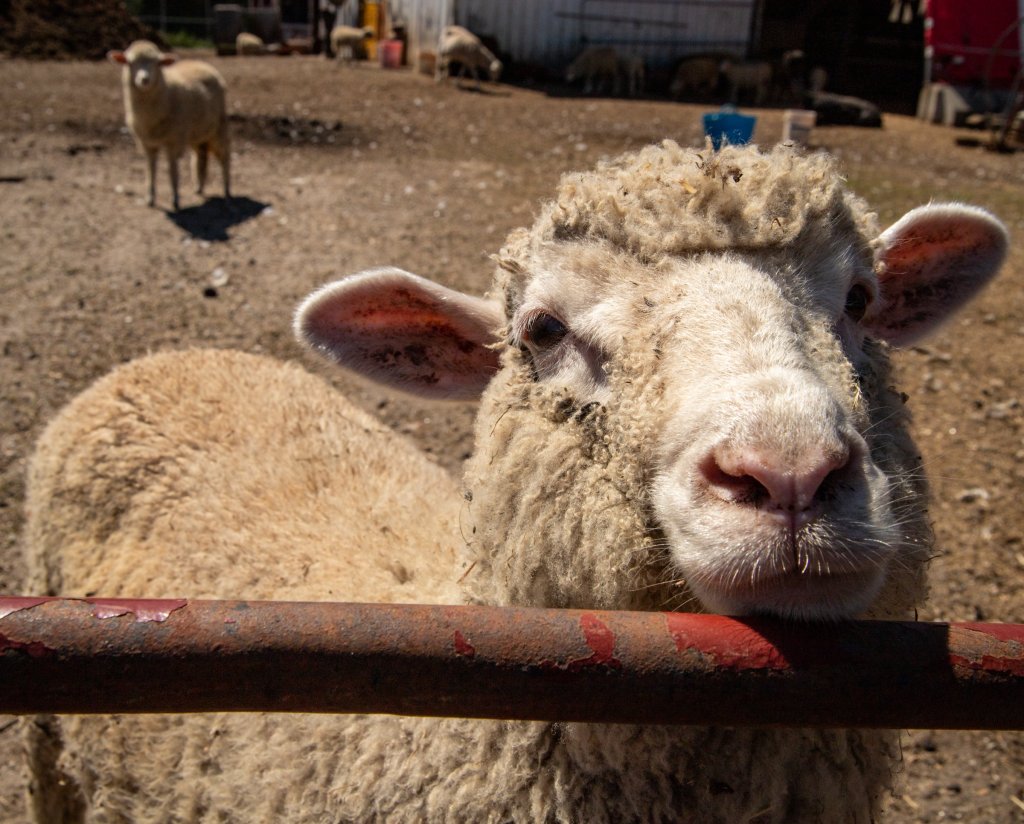
A sheep approaches the rail of its enclosure Aug. 21 at Nezinscot Farm in Turner. The farm sells natural fiber yarn in addition to edible animal products including beef, chicken and milk, as well as fruits and vegetables. The farm’s Community Supported Agriculture program gives it a more reliable stream of income in what can be an uncertain industry. (Libby Kamrowski Kenny/Staff Photographer)
Neither Tracy nor Varney get substantial subsidies for their farms from the federal government, though they do apply for and are awarded federal grants for certain projects, expansions or repairs, they said.
Much of the farm subsidies offered by the federal government go to large-scale or commodity farms, Tracy said.
Varney gets a small subsidy for one of her dairy programs, but outside of that the federal funds she usually gets come in the form of grants, which takes time and manpower to apply for, she said.
When she applied for disaster funds after a major windstorm a few of years ago, it was a process to get those funds, which included having someone come out and assess the damage and compile a “chore list” before she could get the money, she said. The state also has several grant programs for farms, which also require lengthy and competitive application processes.
“But that’s time, and it’s pretty competitive, and if you don’t have somebody on board that is good at grant writing … it’s time consuming to write a grant and do all that. So for us it’s just plug away,” she said.
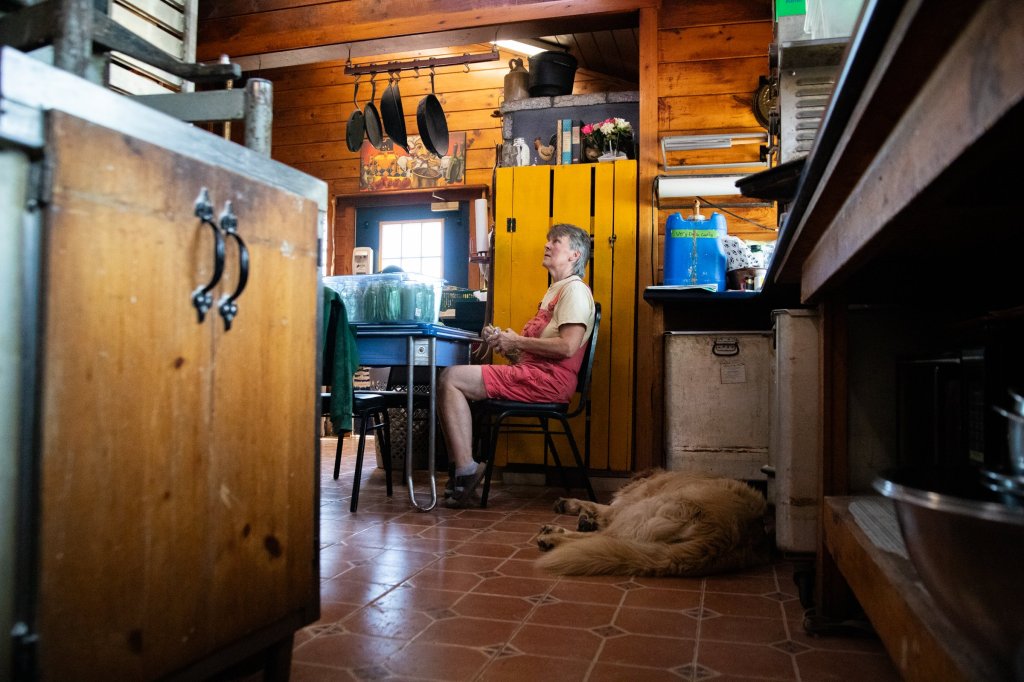
Nezinscot Farm owner Gloria Varney prepares dilly beans for canning Aug. 21 in the farm’s kitchen in Turner. The farm’s Community Supported Agriculture program offers a robust variety of items for those who invest in it, with quarter, half and full shares available. A family can use shares to get take-home produce, nonedible items in the farm’s store such as natural yarn produced from their farm animals, or hot, homemade meals from the farm’s cafe. (Libby Kamrowski Kenny/Staff Photographer)
With federal funding that helped support smaller local farms now being slashed and the bird flu outbreak earlier this year increasing prices in the grocery store and putting a spotlight on national food chain issues, more people are turning to local farms for food and agreeing to invest in them throughout the growing season.
Tracy said she believes that local farms like hers give people in the community a more valuable product than what can be found in grocery stores. The flavor, quality and longevity tend to be better from a local farm, she said.
CSA programs require some flexibility by participants, though, because weekly, biweekly or monthly products might not always contain the select vegetables people are looking for at that time, she said.
The types of vegetables that flourish in a given season can change from year to year, so people will sometimes need to make do with the vegetables ripe at the time, Tracy said.
“Everybody’s always trying to give zucchini away, but our zucchini hasn’t done very well (this year), so there’s just not as much zucchini in the share, but there’s tons of other things and people are definitely getting their money’s worth,” she said.
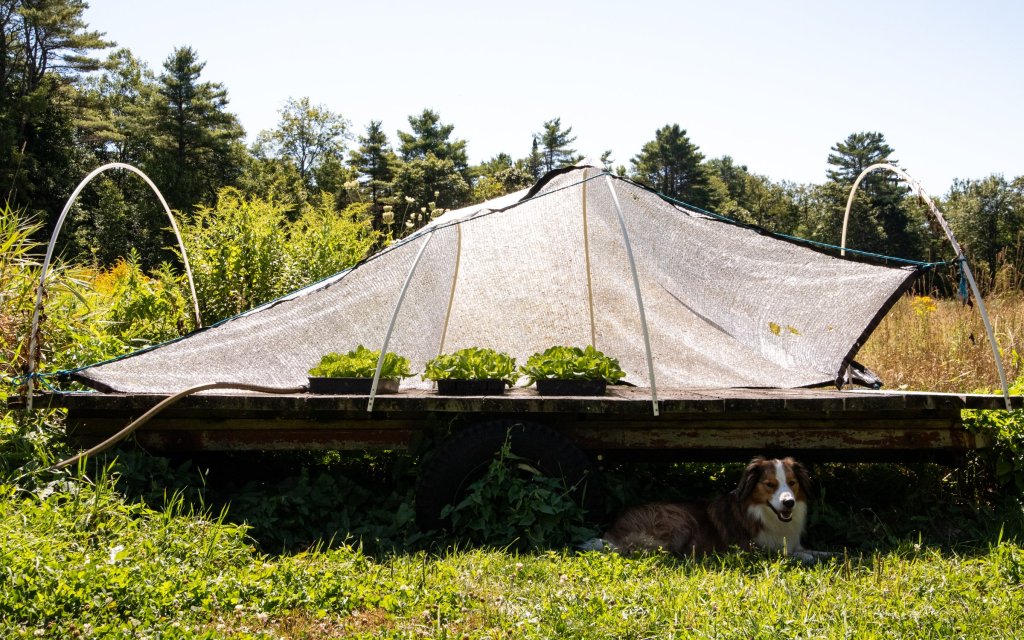
Benny the dog keeps his faithful guard over a lettuce crop Aug. 21 at Little Ridge Farm in Lisbon. The farm is in its 18th year participating in a Community Supported Agriculture program. (Libby Kamrowski Kenny/Staff Photographer)
Though some grow seasons can be more difficult than others, Tracy said she always has enough crop that people will get the value of what they pay for, even if they cannot get the full diversity of food they are looking for. It requires customers to have an open mind.
“Customers need to be very open too and excited and kind of buying into the idea that they are literally supporting local agriculture and they’re interested in eating seasonally,” she said. “They can’t be the customer that’s like, ‘Every day I want to eat a salad with a cucumber and a pepper in it.’ Like, I can’t guarantee that that’s going to be there every week.
“I can guarantee there’ll be something. Like this week there’s cabbage and fennel and cucumbers to make a salad, you know. Like you have to, you have to be a little bit more open minded for sure,” she said.
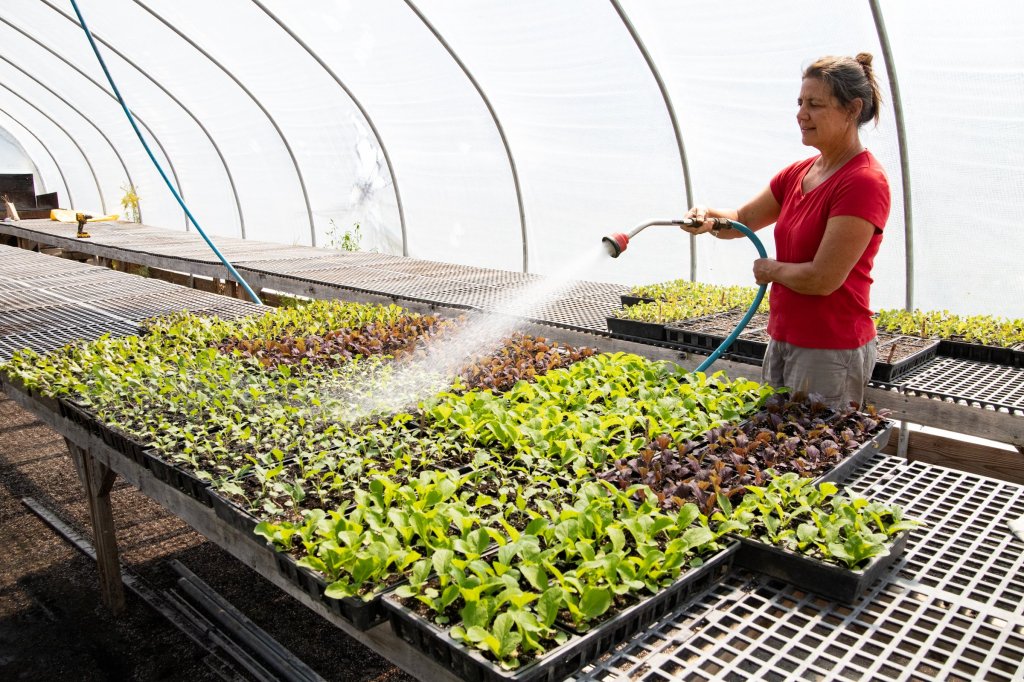
Keena Tracy waters lettuce, kohlrabi and Chinese cabbage Aug. 21 in her greenhouse at Little Ridge Farm in Lisbon. The farm is experiencing success in its 18th year of the Community Supported Agriculture program, which includes 178 families and has a waitlist. The farm offers a summer and winter season for the program, with full and half shares available so that families can choose the amount of fresh produce that suits their needs. The farm is certified organic and participates in the Supplemental Nutrition Assistance Program, or SNAP, which provides food benefits to low-income families to supplement their grocery budget. (Libby Kamrowski Kenny/Staff Photographer)

We invite you to add your comments. We encourage a thoughtful exchange of ideas and information on this website. By joining the conversation, you are agreeing to our commenting policy and terms of use. More information is found on our FAQs. You can modify your screen name here.
Comments are managed by our staff during regular business hours Monday through Friday as well as limited hours on Saturday and Sunday. Comments held for moderation outside of those hours may take longer to approve.
Join the Conversation
Please sign into your CentralMaine.com account to participate in conversations below. If you do not have an account, you can register or subscribe. Questions? Please see our FAQs.